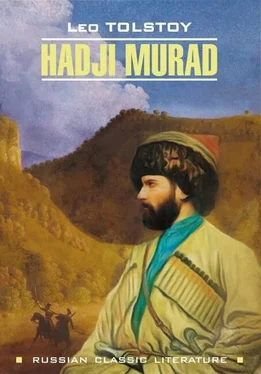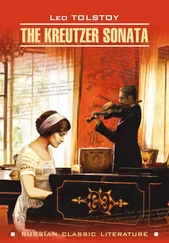Лев Толстой - Hadji Murad / Хаджи-Мурат. Книга для чтения на английском языке
Здесь есть возможность читать онлайн «Лев Толстой - Hadji Murad / Хаджи-Мурат. Книга для чтения на английском языке» — ознакомительный отрывок электронной книги совершенно бесплатно, а после прочтения отрывка купить полную версию. В некоторых случаях можно слушать аудио, скачать через торрент в формате fb2 и присутствует краткое содержание. Год выпуска: 2019, ISBN: 2019, Издательство: Литагент Каро, Жанр: Классическая проза, Русская классическая проза, Прочая научная литература, на английском языке. Описание произведения, (предисловие) а так же отзывы посетителей доступны на портале библиотеки ЛибКат.
- Название:Hadji Murad / Хаджи-Мурат. Книга для чтения на английском языке
- Автор:
- Издательство:Литагент Каро
- Жанр:
- Год:2019
- ISBN:978-5-9925-1227-4
- Рейтинг книги:3 / 5. Голосов: 1
-
Избранное:Добавить в избранное
- Отзывы:
-
Ваша оценка:
- 60
- 1
- 2
- 3
- 4
- 5
Hadji Murad / Хаджи-Мурат. Книга для чтения на английском языке: краткое содержание, описание и аннотация
Предлагаем к чтению аннотацию, описание, краткое содержание или предисловие (зависит от того, что написал сам автор книги «Hadji Murad / Хаджи-Мурат. Книга для чтения на английском языке»). Если вы не нашли необходимую информацию о книге — напишите в комментариях, мы постараемся отыскать её.
Hadji Murad / Хаджи-Мурат. Книга для чтения на английском языке — читать онлайн ознакомительный отрывок
Ниже представлен текст книги, разбитый по страницам. Система сохранения места последней прочитанной страницы, позволяет с удобством читать онлайн бесплатно книгу «Hadji Murad / Хаджи-Мурат. Книга для чтения на английском языке», без необходимости каждый раз заново искать на чём Вы остановились. Поставьте закладку, и сможете в любой момент перейти на страницу, на которой закончили чтение.
Интервал:
Закладка:
So when ninety-six bushels of the winnowed oats had been packed onto three sledges lined with sacking carefully pinned together at the top with wooden skewers, she gave her husband a letter the church clerk had written at her dictation, and the old man promised when he got to town to enclose a ruble and send it off to the right address.
The old man, dressed in a new sheepskin with homespun cloak over it, his legs wrapped round with warm white woollen leg-bands, took the letter, placed it in his wallet, said a prayer, got into the front sledge, and drove to town. His grandson drove in the last sledge. When he reached town the old man asked the innkeeper to read the letter to him, and listened to it attentively and approvingly.
In her letter Peter’s mother first sent him her blessing, then greetings from everybody and the news of his godfather’s death, and at the end she added that Aksinya (Peter’s wife) had not wished to stay with them but had gone into service, where they heard she was living honestly and well. Then came a reference to the present of a ruble, and finally a message which the old woman, yielding to her sorrows, had dictated with tears in her eyes and the church clerk had taken down exactly, word for word:
“One thing more, my darling child, my sweet dove, my own Peterkin! I have wept my eyes out lamenting for thee, thou light of my eyes. To whom has thou left me? … ” At this point the old woman had sobbed and wept, and said: “That will do!” So the words stood in the letter; but it was not fated that Peter should receive the news of his wife’s having left home, nor the present of the ruble, nor his mother’s last words. The letter with the money in it came back with the announcement that Peter had been killed in the war, “defending his Tsar, his Fatherland, and the Orthodox Faith.” That is how the army clerk expressed it.
The old woman, when this news reached her, wept for as long as she could spare time, and then set to work again. The very next Sunday she went to church and had a requiem chanted and Peter’s name entered among those for whose souls prayers were to be said, and she distributed bits of holy bread to all the good people in memory of Peter, the servant of God.
Aksinya, his widow, also lamented loudly when she heard of the death of her beloved husband with whom she had lived but one short year. She regretted her husband and her own ruined life, and in her lamentations mentioned Peter’s brown locks and his love, and the sadness of her life with her little orphaned Vanka, and bitterly reproached Peter for having had pity on his brother but none on her – obliged to wander among strangers!
But in the depth of her soul Aksinya was glad of her husband’s death. She was pregnant a second time by the shopman with whom she was living, and no one would now have a right to scold her, and the shopman could marry her as he had said he would when he was persuading her to yield.
Chapter IX
Michael Semenovich Vorontsov, being the son of the Russian Ambassador, had been educated in England and possessed a European education quite exceptional among the higher Russian officials of his day. He was ambitious, gentle and kind in his manner with inferiors, and a finished courtier with superiors. He did not understand life without power and submission. He had obtained all the highest ranks and decorations and was looked upon as a clever commander, and even as the conqueror of Napoleon at Krasnoe.
In 1852 he was over seventy, but young for his age, he moved briskly, and above all was in full possession of a facile, refined, and agreeable intellect which he used to maintain his power and strengthen and increase his popularity. He possessed large means – his own and his wife’s (who had been a countess Branitski) – and received an enormous salary as Viceroy, and he spent a great part of his means on building a palace and laying out a garden on the south coast of the Crimea.
On the evening of December the 4th, 1852, a courier’s troika drew up before his palace in Tiflis. an officer, tired and black with dust, sent by General Kozlovski with the news of Hadji Murad’s surrender to the Russians, entered the wide porch, stretching the stiffened muscles of his legs as he passed the sentinel. It was six o’clock, and Vorontsov was just going in to dinner when he was informed of the courier’s arrival. He received him at once, and was therefore a few minutes late for dinner.
When he entered the drawing room the thirty persons invited to dine, who were sitting beside Princess Elizabeth Ksaverevna Vorontsova, or standing in groups by the windows, turned their faces towards him. Vorontsov was dressed in his usual black military coat, with shoulderstraps but no epaulets, and wore the White Cross of the Order of St. George at his neck.
His clean shaven, foxlike face wore a pleasant smile as, screwing up his eyes, he surveyed the assembly. Entering with quick soft steps he apologized to the ladies for being late, greeted the men, and approaching Princess Manana Orbelyani – a tall, fine, handsome woman of Oriental type about forty-five years of age – he offered her his arm to take her in to dinner. Princess Elizabeth Ksaverevna Vorontsova gave her arm to a red-haired general with bristly mustaches who was visiting Tiflis. A Georgian prince offered his arm to Princess Vorontsova’s friend, Countess Choiseuil. Doctor Andreevsky, the aide-de-camp, and others, with ladies or without, followed these first couples. Footmen in livery and knee-breeches drew back and replaced the guests’ chairs when they sat down, while the major-domo ceremoniously ladled out steaming soup from a silver tureen.
Vorontsov took his place in the center of one side of the long table, and wife sat opposite, with the general on her right. On the prince’s right sat his lady, the beautiful Orbelyani; and on his left was a graceful, dark, red-cheeked Georgian woman, glittering with jewels and incessantly smiling.
“Excellentes, chère amie!” replied Vorontsov to his wife’s inquiry about what news the courier had brought him. “Simon a eu de la chance!” 17 17 Excellentes, chère amie! … Simon a eu de la chance! – They are excellent, my friend! … Simon was lucky!
And he began to tell aloud, so that everyone could hear, the striking news (for him alone not quite unexpected, because negotiations had long been going on) that Hadji Murad, the bravest and most famous of Shamil’s officers, had come over to the Russians and would in a day or two be brought to Tiflis.
Everybody – even the young aides-de-camp and officials who sat at the far ends of the table and who had been quietly laughing at something among themselves – became silent and listened.
“And you, General, have you ever met this Hadji Murad?” asked the princess of her neighbor, the carroty general with the bristly mustaches, when the prince had finished speaking.
“More than once, Princess.”
And the general went on to tell how Hadji Murad, after the mountaineers had captured Gergebel in 1843, had fallen upon General Pahlen’s detachment and killed Colones Zolotukhin almost before their very eyes.
Vorontsov listened to the general and smiled amiably, evidently pleased that the latter had joined in the conversation. But suddenly his face assumed an absent-minded and depressed expression.
The general, having started talking, had begun to tell of his second encounter with Hadji Murad.
“Why, it was he, if your Excellency will please remember,” said the general, “who arranged the ambush that attacked the rescue party in the Biscuit’ expedition.”
“Where?” asked Vorontsov, screwing up his eyes. What the brave general spoke of as the “rescue” was the affair in the unfortunate Dargo campaign in which a whole detachment, including Prince Vorontsov who commanded it, would certainly have perished had it not been rescued by the arrival of fresh troops. Every one knew that the whole Dargo campaign under Vorontsov’s command – in which the Russians lost many killed and wounded and several cannon – had been a shameful affair, and therefore if any one mentioned it in Vorontsov’s presence they did so only in the aspect in which Vorontsov had reported it to the Tsar – as a brilliant achievement of the Russian army. But the word “rescue” plainly indicated that it was not a brilliant victory but a blunder costing many lives. Everybody understood this and some pretended not to notice the meaning of the general’s words, others nervously waited to see what would follow, while a few exchanged glances, and smiled. Only the carroty general with the bristly mustaches noticed nothing, and carried away by his narrative quietly replied:
Читать дальшеИнтервал:
Закладка:
Похожие книги на «Hadji Murad / Хаджи-Мурат. Книга для чтения на английском языке»
Представляем Вашему вниманию похожие книги на «Hadji Murad / Хаджи-Мурат. Книга для чтения на английском языке» списком для выбора. Мы отобрали схожую по названию и смыслу литературу в надежде предоставить читателям больше вариантов отыскать новые, интересные, ещё непрочитанные произведения.
Обсуждение, отзывы о книге «Hadji Murad / Хаджи-Мурат. Книга для чтения на английском языке» и просто собственные мнения читателей. Оставьте ваши комментарии, напишите, что Вы думаете о произведении, его смысле или главных героях. Укажите что конкретно понравилось, а что нет, и почему Вы так считаете.












